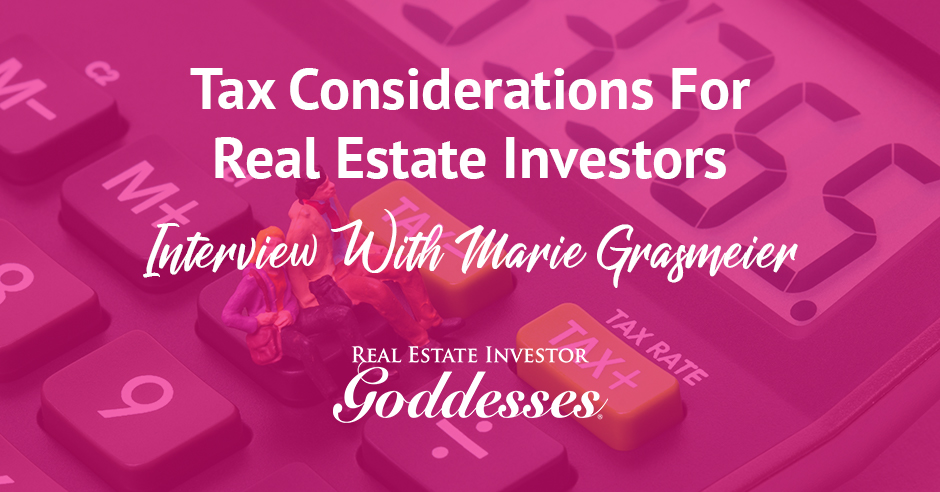
Tax considerations are one of the biggest things you have to think about when you’re going into real estate investing. While a certain property or deal might seem appealing at the moment, without the foresight given by thorough tax considerations, you might end up having to shell out so much more money in the long run. Monick Halm is joined by Marie Grasmeier, the Founder of Grasmeier Business Consulting. Together, they talk about some of the most important tax considerations all real investors should think about. Don’t miss this energized conversation about a very important topic.
—
Listen to the podcast here:
Tax Considerations For Real Estate Investors – Interview With Marie Grasmeier
Our goddess is a woman that is not only a successful investor but also a tax expert. One of the main benefits of investing in real estate is the tax savings it can help you create, and our guest knows all about that. She’s going to share some important tax considerations for us, especially in light of the tax law that was passed in 2017. Marie is the Founder of Grasmeier Business Consulting. She’s a CPA providing tax and consulting services to domestic and international individuals and businesses. Marie is also a Certified Management Accountant, Certified Global Management Accountant and a Registered Trust and Estate Practitioner.
She specializes in assisting foreign investors with their US tax and compliance needs. She also enjoys working with entrepreneurs through the entire lifecycle of a business, from startups to succession planning. She’s fluent in Swedish. She’s developed a niche in assisting clients from Scandinavia. She grew up in Sweden. Marie is a member of the American Institute of CPAs, the Florida Institute of CPAs, the Institute of Management Accountants, and STEP International. I’m thrilled to have her here. Welcome, Marie.
Thank you, Monick. Thank you for having me on your show. I’m excited for the opportunity to share tax tips for real estate investors.
Before we get into the tax tips, I’d love for you to share a little bit about your story in real estate investing because you’re an investor yourself. How did you get started in real estate investing?
My husband and I got started in real estate, investing as soon as we got married. We started out small like most people, renting out our condo instead of selling it when we bought our first house, but that’s a great way to start out small and try it out. It worked well for us. Since then, we have invested in land, single-family houses, and condos here in Florida, where we live.
You’re an investor yourself, but I wanted to get you here to share a little bit more about the tax side because it is such an important part of real estate investing here in the US. What are some of the tax benefits of investing in real estate?
Even if you have a positive cash flow, depreciation will often generate a tax loss. Share on XThere are a lot of tax benefits for real estate investors. That goes to whether you hold title directly in your name or hold it in one of your businesses or if you’re a passive investor in syndication or in a real estate investment trust or any other type of entity or joint venture. Let’s start by talking about holding an investment in your own name or an entity that you self-manage because this is the easiest way to get started. For example, we had a condo and we rented it out. Usually, we’ll have a regular monthly cashflow, but even if you have positive cashflow after your operating expenses, depreciation will often generate a tax loss. Depreciation is a non-cash expense.
For example, let’s say you buy a condo for $500,000. It’s a residential real estate. It will be depreciated over 27 and a half years using a straight-line method. In that example, the annual tax deduction for depreciation is around $18,000, which helps you reduce income. You can also get income from other sources other than the rental. Using the same example, if you bought a commercial property, you would write it off over 39 years instead of 27.5, and then that annual deduction will be around, $12,800. That’s one good thing about depreciation. Of course, if you borrow funds for rental property, your tenant essentially pays off the property for you. You can take a tax deduction for the interest. At the same time, you’re building equity and you’re building wealth by having that tenant in there.
I want to highlight something that you said because a lot of people don’t realize this. Even though you’re making money in real estate because of the way the tax laws are structured, on paper, it looks like you’ve lost money. You are making money, but then you end up paying less taxes. No one has seen Donald Trump’s tax returns because he hasn’t shared them. I wouldn’t be surprised if his tax burden is $0 because of the way the tax laws are written. Even though you’re making money on paper, it looks like you’re losing money.
Going back to depreciation, there’s also other vehicles and schemes you can use. For example, accelerated depreciation. You can do a cost segregation study to get more accelerated depreciation and take more expenses in the early years. You can work with the timing of those deductions. I talked about owning it or managing yourself. Of course, you can have a property management company. It helps with the management, but you can also put your funds into more of a passive investment where you do not have to be involved in the management. That will be if you put your money into a real estate investment trust or another type of vehicle where you earn a fixed return in the form of interest, dividends, disbursements, or tax credit that you can utilize. There are many different ways that can give you benefits for tax purposes.
We syndicate or commercial properties or apartment buildings and the like, and our investors get part of the appreciation as well. Even though they’re passive, they still get to enjoy those tax benefits. In 2017, there was a tax law that was passed. What are some of the major changes from that tax law that apply to real estate investors?
There are a few of the new rules that I want to highlight that can benefit our readers here. We’re talking about the Tax Cuts and Jobs Act, and it was effective as of January 2018. If you haven’t filed your ‘17 taxes yet, because as an individual, you have until October of 2018, it won’t affect those taxes. For the year 2018, this is what we’re going to be talking about. A lot of investors and a lot of my clients, they hold their real estate in pass-through entities. What I’m referring to are entities that pass through the items of income and expenses to their owners such as a partnership, an S corporation or a limited liability company that has not made an election to be taxed as another type of entity.
The new law here says that only 80% of the net profit from a trader business, including rental real estate is exempt from tax. You’re getting a 20% exemption from taxable income, and that’s great. You get 80% instead of 100%. For many ultimate investors or individuals that the maximum tax rate has been lowered from 39.6% to 29.6%. Not only is 20% of taxable income exempt, but the remaining profits are taxed at a 10% lower rate. The word on the street is that this will have a huge impact on all businesses because approximately 95% of all US businesses are taxed as pass-through entities. We’re going to see a great benefit here.

Tax Considerations: You can do a cost segregation study for accelerated depreciation, take more expenses in the early years, and work with the timing of those deductions.
There’s something else I want to highlight. This is good for anyone that’s self-employed. A lot of my clients are realtors, brokers, and property managers. They have their businesses and they’re considered to be self-employed and use their vehicles for business purposes. We have something that’s called Section 179, which allows new business assets to be deducted in the year you purchase them instead of having to capitalize them and depreciate it. You probably heard this. It’s been around for some years. It was called SUV Loophole or the Hummer Deduction, where you could write off $25,000 of an SUV or heavy truck that qualified. To qualify, they have to weigh more than 6,000 pounds, fully-loaded, and be in a truck chassis.
There are all these lifts to the vehicles to be qualified, but it was still limited to the $25,000, and then you could take depreciation on the remaining basis. Plus, this new law in ‘18, you can combine this Section 179 deduction with 100% bonus depreciation, which lets you write off the entire cost of the vehicle and you can take a loan on it. You don’t have to purchase it for cash. To give you an example to show what I mean, let’s say you make $500,000 and you have $400,000 for other expenses, so your net profit is $100,000. You buy a vehicle for $100,000 and now your income is $0. If you have federal income tax at 20% and self-employment tax at 15.3%, you’re saving 35.3% in taxes. We’re going to see a lot of big vehicles being purchased.
This is just for bigger vehicles. They have to weigh a certain amount.
These are your big SUVs and trucks. There is a list of exactly which vehicles will qualify. The last thing I wanted to touch base on is also something new out of this law that said that all of the governors in the US could identify opportunities zones. It’s still underdeveloped, low income that needed a boost. There’s a provision that an investor can set up a fund called an opportunity fund in an opportunity zone and investors that have unrealized capital gains or realized capital gains. Let’s say you have stock in the stock market that you know have appreciated, but you just leave it there because you don’t want to pay the capital gains. You sold an investment property and you have this huge capital gain. Maybe you were thinking about doing a 1031 like-kind exchange to defer it but you didn’t.
Let’s say you recognize the gain. Whether it’s on a stock market or from a property, you have 180 days to put it into this fund. After five years, you can defer 10% capital gains if you hold that investment in two years for seven years, and you can defer at 5%, so now you deferred 15% on the original 100% gain. If you leave that investment in that fund for another three years for a total of ten, you get a 100% step-up in the basis of the appreciation in the fund itself. When you sell that investment after ten years, you don’t pay any capital gain on that last appreciation. We also think that this will give the economy a great boost to get those capital gains out of the market, being unrealized and getting to use in these laws all over the countries where development can take place.
I want to make sure I understand and our readers understand. You have capital gains. You’ve sold some investment property or stocks, then you would like to avoid the capital gains. You’re not doing 1031, you’re going to put that money into an opportunity fund. Is that a fund that you can put yourself or somebody else has an opportunity fund and you’re just putting in money? How does that work?
You have to make sure that your funds are in a zone that's approved. Share on XYou can look for funds that are already created or you can create your own. We’re waiting for more guidance on how this is going to work, but it’s a self-certifying process where you have to make sure that your fund is in a zone that’s approved. That fund has to reinvest the money into either a business that operates in that zone or in business property. When it comes to real estate, significant improvements have to be made to that property, but we’re waiting for guidance on what significant improvement means. It will be based on facts and circumstances. You buy an old hotel and then you revamp it or you demolish it, and you build a new one. Things like that would qualify.
It’s not surprising that the president who architected the tax law was a real estate investor. It’s a beneficial offer. What are some of the biggest mistakes that real estate investors make regarding their taxes? There are a lot of things that you can do to use real estate to save taxes. What are some of the mistakes that you see?
One of the mistakes that I see is going back to the passive activities versus active activities because sometimes, especially when you have rental real estate, those losses can be suspended. Passive losses are generally only deductible to the expense of passive income, but there are some exceptions. A special rule for individuals is that, let’s say you have one rental property, it will let you deduct up to $25,000 of losses from rental real estate on a joint return. Sometimes, if your modified adjusted gross income, and let’s think of it as your total income is over a certain limit, then that’s usually $150,000 for your joint return, those passive losses are starting to be phased out.
You may not be able to take advantage of it. The timing is important between all of your investments to time the losses and the profits. There are also rules for real estate professionals. If you are a real estate professional and you have these types of losses and you actively materially participate in the management in all your investments, then you’re able to take the losses as well. That’s one thing that people say, “Why can I take my loss?” This is why and we should have talked about it before when we did get your tax planning.
We did talk about this in conjunction with the SUV example. A lot of these investors are considered self-employed because they don’t get paid on a W-2 from a third-party employer. In addition to the income tax, you’re also subject to the self-employment tax, which represents both the employer’s and employees’ portion of social security taxes and Medicare taxes. That’s something that I do work with a lot of realtors and they say, “Why do I have to pay this? I have all these other deductions.” Self-employment tax is like it’s stuck with its system. You can’t eliminate the self-employment tax by, for example, itemized deductions, standard deductions, or tax credits. That’s something also to be aware of when you are investing.
Any other mistakes that you see people make?
Sometimes, perhaps not being prepared, not doing their due diligence, and maybe just jumping on investment without talking to their professionals and their team of advisors to see if there was something that was viable. Sometimes, unfortunately, when friends and family members go into business together, they don’t have a proper operating agreement or bylaws. If something happens between them, things can get ugly. I would say, especially if you invest with other partners to have those documents in place.

Tax Considerations: Going back to passive activities versus active activities can be a mistake because those losses can be suspended.
It’s crucial. When people are investing with people that they’re close to like family members or friends, they go, “That’s my brother or my friend. I don’t have agreements with them.” If you care about the relationship, then you particularly need agreements. Clear agreements don’t jeopardize relationships. They save them. It involves your money. It’s important that people have clear agreements between them.
Monick, I do work with a lot of foreign investors. One big mistake that I see a lot for them is that they are not aware of the FIRPTA, which is a 15% mandatory withholding tax when a non-US person disposes of US real property. That gets taken out at closing and it’s being remitted to the IRS at closing. It can be a huge surprise because it’s based on 15% of the gross sales price and has no correlation to the actual 15% of the tax on the taxable income. It doesn’t take into consideration the basis or any closing costs. I’ve had a lot of calls on the closing table, “What is going on?” I was like, “You should have consulted with me first. Someone should have told you that this exists. We could have mitigated it prior to closing but at closing, there’s not anything we can do because we have to do all the golden certificate before closing if we are going to mitigate that withholding.”
There’s a client who lives in Sweden and they bought a property here. The sale price is $1 million, so they’re going to owe 15%, $150,000 to the government?
Yes, it’s going to be to remitted to the IRS from the closing proceeds and then the taxpayer has the opportunity to file a tax return for the year of the sale and show the IRS, “I had basis and this is my taxable gain. This is my tax liability, which is this smaller than the 50% withheld. I now request a refund.” If you go to closing early in the year and you have to wait a whole year to file the return, and then wait another three months on the refund, that’s a lot of lost money that you could put into better use and earn a return of than just having it remitted to IRS.
That’s something important for international investors to know. As a syndicator who sometimes has investors from outside of the country or a passive international investor, would that affect the investment as well?
For example, if you have set it up as a partnership or LLC, what would happen in that case is we will forego the actual source of holding, but the partnership would have to withhold the tax on behalf of the foreign partner. When you calculate the gain on the sales transaction, you will allocate the pro-rata share to the foreign partners, and then the partnership would have to withhold and remit the tax on behalf of those foreign partners. It would be something that you would have considered for your foreign partners.
You can't eliminate self-employment tax with itemized deductions, standard deductions, or tax credits. Share on XWhat type of legal entity is best for real estate investors? We’ve talked about different entities that people might be in. What would you say is best?
I do a whole seminar on this because there are many factors that need to be considered. I would say it depends on the overall strategic plan and the client’s short and long-term goals and objectives. It depends on how active the person who wants to be in the day-to-day management and it would also depend on if they plan on bringing in other investors into these specific investments. Also, if any of those entities or individuals are foreign. It’s important to look at the whole picture and also speak with the client’s attorneys and other advisors before I make a recommendation.
Having said that, the most common entity is this single-member or multi-member LLC, followed by a partnership. That’s an easy way to structure it. I often steer people away from the traditional C corporation because of double taxation and other issues. For some investors, particularly some of my investors from Malaysia and from Europe, they like the C corporation because of certain treaties and for disclosure purposes. I have a lot of foreign investors that are in REIT. It’s an easy way and it’s an attractive way to hold real estate, and you get a guaranteed dividend and a sudden return on investment. That is something that should be considered as well.
For those of you who don’t know, it is a Real Estate Investment Trust. How do you work with investors for tax planning and wealth building?
I like to be proactive with my clients and work with their team because it’s important. I like to identify innovative strategies for my clients that fit their needs. I’m big on listening and try to understand what it is they’re looking for. If they’re foreign investors, do they want to come here on a visa? What type of visa do they need? Do they want to become a citizen? Do they want their children to be coming here to go to school? I try to work with them for the optimal solution.
There are a lot of different variables that can go into deciding what kind of entity to do and how we want to pay. It’s great that you take the time to find out everyone’s needs because real estate investing is not one size fits all. You have to meet the person where they’re at. For those interested in finding out more about what you do or work with you, what’s the best way for them to get in contact with you?
My website is www.MarieCPA.com or email me at [email protected]. That’s probably the easiest way, either website or email.
It’s time for our famed end of show trinity. What’s one thing you are celebrating?

Tax Considerations: When people are investing with folks they’re close to, like family or friends, they tend to neglect to create a clear agreement between both parties.
I’m celebrating the opportunity to contribute to your book, Wealth for Women. I’m excited for the book. I’m also excited to participate in your conference in LA.
I’m celebrating that, too. I have talked about this before in the show briefly that we have a book coming out. It’s called Wealth for Women: Conversations with the Team That Creates the Dream. In that book are interviews with fifteen incredible women, team members, and people that are important for being successful in real estate investing. Marie is one of our featured CPA for that book. I’m excited that you’re in the book, Marie. She mentioned our Wealth Through Real Estate Event, which is happening in Los Angeles and you can join us there by going to WealthThroughRealEstateEvent.com and you’ll get to meet Marie, me, and other incredible women. What’s one thing you’re grateful for?
I am grateful every day for my family, our health, the people who have helped, guided, and mentored me in my life. I’m incredibly blessed and it’s hard to take one thing but if I had to take one thing, it would have been my daughter. She’s my everything. My husband and I were married for many years before we were blessed with her. I love her.
Lastly, what’s one thing you desire?
I always desire to help people. I feel that I do that in my business and my volunteer work. I try to be helpful and be a good person. Trying to do that every day, happiness and inner peace will follow.
You desire to help more people every day. Shall your desire be or so much better than you can imagine. Thank you for that. That was informative and great. You guys can reach Marie at www.MarieCPA.com or [email protected]. You can meet her live Wealth Through Real Estate Event. Go to WealthThroughRealEstateEvent.com to register and if you use the code WEALTHY, you can get a significant discount. Join us there and join us next episode for another real estate investor goddess episode. Bye.
Important Links:
- Grasmeier Business Consulting
- www.MarieCPA.com
- [email protected]
- Wealth for Women
- WealthThroughRealEstateEvent.com
About Marie Grasmeier
 Marie Grasmeier is the owner of Grasmeier Business Services, LLC. She provides domestic and international tax services and consultation to individuals, corporations, partnerships, limited liability companies and not-for-profit organizations. She has been a member of the American and Florida Institute of Certified Public Accountants since 2001.
Marie Grasmeier is the owner of Grasmeier Business Services, LLC. She provides domestic and international tax services and consultation to individuals, corporations, partnerships, limited liability companies and not-for-profit organizations. She has been a member of the American and Florida Institute of Certified Public Accountants since 2001.
She is also a Certified Management Accountant and member of the Institute of Certified Management Accountants. She holds a B.S. in Accounting, Magna Cum Laude, from Florida Atlantic University and a M.S. in Accounting & Taxation from Florida Gulf Coast University.
Marie recently qualified for the Chartered Global Management Accountant designation awarded to Professionals because of their commitment to ethics, professional development and expertise in the field of mangement accounting. The designation is issued by the American Institute of CPAs and Chartered Institute of Management Accountants (CIMA).
Marie has been honored as one of Gulf Shore Business 40 under forty bright young leaders and is a frequent speaker on tax topics in the local community and on the radio.
Marie is a graduate of Leadership Lee County and is currently Vice Chair for the American Red Cross Florida’s Southern Gulf Coast Region serving Lee, Collier, Hendry and Glades counties. She serves on the Small Business Development Center at FGCU Regional Advisory Board, on the Small Business Resource Network SW Florida Chapter Steering Committee and she is the Treasurer of the Noonan Academy of Fort Myers, PTA.
Love the show? Subscribe, rate, review, and share!
Join the Real Estate Investor Goddesses Community today:





